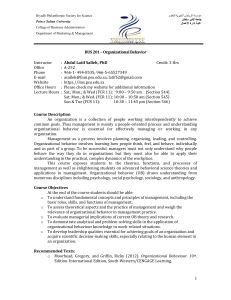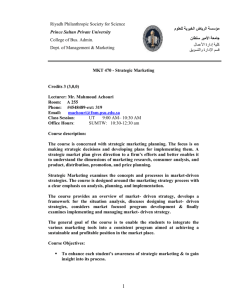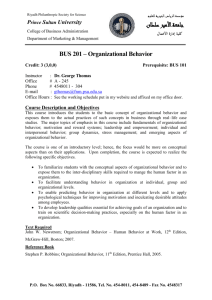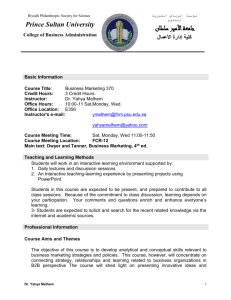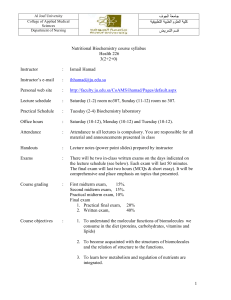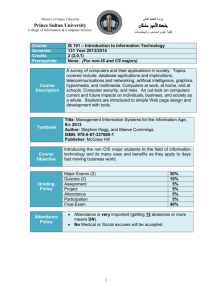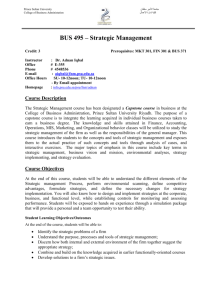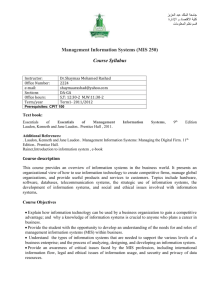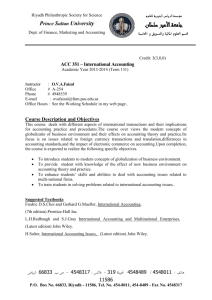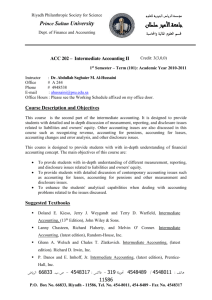MKT 340 – Marketing Channel
advertisement
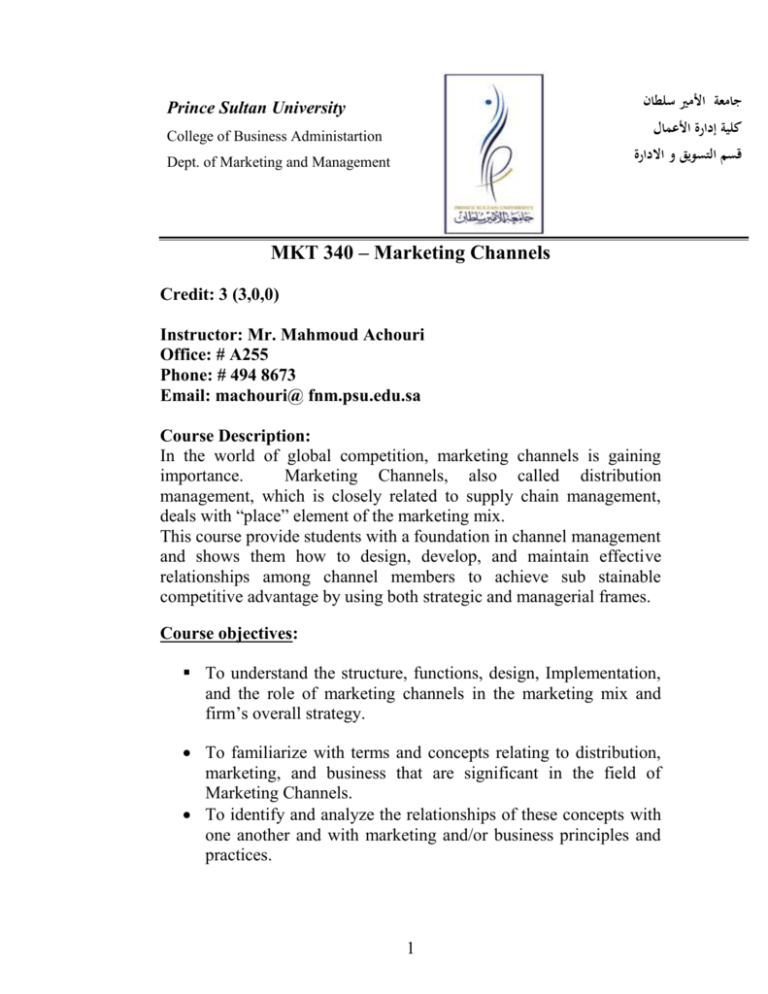
جامعة األمري سلطان Prince Sultan University كلية إدارة األعمال College of Business Administartion قسم التسويق و االدارة Dept. of Marketing and Management MKT 340 – Marketing Channels Credit: 3 (3,0,0) Instructor: Mr. Mahmoud Achouri Office: # A255 Phone: # 494 8673 Email: machouri@ fnm.psu.edu.sa Course Description: In the world of global competition, marketing channels is gaining importance. Marketing Channels, also called distribution management, which is closely related to supply chain management, deals with “place” element of the marketing mix. This course provide students with a foundation in channel management and shows them how to design, develop, and maintain effective relationships among channel members to achieve sub stainable competitive advantage by using both strategic and managerial frames. Course objectives: To understand the structure, functions, design, Implementation, and the role of marketing channels in the marketing mix and firm’s overall strategy. To familiarize with terms and concepts relating to distribution, marketing, and business that are significant in the field of Marketing Channels. To identify and analyze the relationships of these concepts with one another and with marketing and/or business principles and practices. 1 جامعة األمري سلطان Prince Sultan University كلية إدارة األعمال College of Business Administartion قسم التسويق و االدارة Dept. of Marketing and Management To demonstrate through case analyses and other assignments the application and use these concepts in marketing and/or business situations. To study different types of channel institutions and explore the newly established channels. To prepare for entry into higher-level courses in marketing. Topics to be Covered : An Analytic Framework for channel Design &Implementation: Channel design-segmentation, positioning& targeting, Establish new channels or refine existing ones. Channel design: Demand, supply and competition Segmentation for Marketing Channel Design: Service Outputs Supply-Side Channel Analysis: Channel Flows and Efficiency Analysis- Channels flows, using channel flow concepts to design a zero bazed channel. Channel Structure and Membership Issue: Who should be in the channel? What types of intermediaries should be used? A single channel or dual distribution? Gap analysis: Sources and types of channel gaps: Demand side gaps, supply side gaps, Closing channel gaps, Vertical integration: owning the channel: degrees of vertical integration, reasons to outsource distribution, Channel Implementation and performance measurement: Channel Power: sources of power Managing Conflict to Increase Channel Coordination Strategic Alliances in Distribution Channel Institutions: 2 جامعة األمري سلطان Prince Sultan University كلية إدارة األعمال College of Business Administartion قسم التسويق و االدارة Dept. of Marketing and Management Retailing Non-store Retailing and Electronic Channels Wholesaling Franchising Grading Your grade will be based on the following: Major 1and 2 = 18*2%=36% Final Exam 40% Project =10% Assignments & case Analysis + presentation 8% Class participation & attendance 6% The midterm and final examinations (76%) will follow the normal pattern of the university. There are three examinations for the semester, two major exams and Final exam. Assignments, case Analysis, & presentation (18%) There will be a project which counts of 10% and selected of case studies in the field of marketing channels. Students will discuss and analyze each case, and will come up with suggested solutions, they will submit report and present their results. During the semester, two home work assignments will be given and each count for (4 %) of your final grade. Class participation & attendance 6% Class participation means making meaningful contributions and showing evidence of preparation during the discussions of the issues. Absence from class means no participation, which means lower final grade. Course Text book: Anne T.Coughlan , Erin Anderson , Lowis W. Stern & Adel I. ElAnsary. Marketing Channels, 7Th Edition . Prentice Hall , 2006. 3 Recommended Reference: Bert Rosenbloom. Marketing Channels: A Management View , 6Th Edition. The Dryden Press , 1998 4
